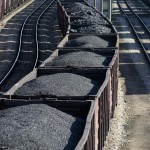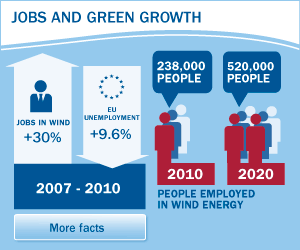 The European Commission’s move to rein in coal subsidies by suggesting that unprofitable mines be shut down within the next four years has received wide coverage this morning. The move, announced yesterday and set for formal approval in December this year, would see the closure of hard coal mines located mainly in Germany’s Ruhr region, north-west Spain and Romania’s Jiu Valley.
The European Commission’s move to rein in coal subsidies by suggesting that unprofitable mines be shut down within the next four years has received wide coverage this morning. The move, announced yesterday and set for formal approval in December this year, would see the closure of hard coal mines located mainly in Germany’s Ruhr region, north-west Spain and Romania’s Jiu Valley.
The announcement is a signal that the European Commission firmly believes that renewable energies, including wind power, are the path to a carbon-neutral future:
“Renewable, clean energy is the way to go,” said European Commissioner for competition Joaquín Almunia, reported by EurActiv.
Leading environment group WWF said the Commission has finally “stood up to complacent attitudes and acted in the broader European interest”. In total, subsidies to the sector hit €3.2 billion in 2008, down from €6.4 billion in 2003, the Financial Times noted in its article.
The Ecocentric blog described coal subsidies as the “dirty secret of fossil fuels.” Coal receives tax payer support “even in environmentally friendly Europe.”
But the Commission’s proposal could hit opposition from some countries in Europe that are heavily reliant on hard coal. According to the New York Times Green Blog about a month ago, Spain, Slovakia, Hungary and Romania want to keep coal subsidies while the industry also employs around 100,000 people across Europe.
Meanwhile, EWEA foresees the creation of around 250,000 new jobs in the European wind industry by 2020.
Join the discussion by commenting below…
The final text of the G20 summit of world leaders in Toronto which ended on Sunday contained mixed messages for wind energy. Here, we report on how the news travelled around the green community.
In a positive move, picked up by Business Green, the G20 reiterated a previous pledge to phase out expensive and inefficient fossil fuel subsidies – which are worth around $550 billion a year. The text said fossil fuel subsidies “encourage wasteful consumption”, adding that they will be phased out “over the medium term”. It also pledged to review progress on the phase out – which could cut global carbon emissions by around 7% according to the International Energy Agency – at upcoming summits, something which we too will be watching closely.
But the bad news for wind energy, reported by the Earth Times, came as the leaders of the G20 agreed to drop an earlier pledge to commit to investments in clean energy. In the final text, this was watered down to a “commitment to a green recovery and to sustainable global growth.”
According to the WWF blog, this is a substantial change from the Pittsburgh G20 summit in 2009 which contained eight references to ‘clean energy’. “They want through this document with a vacuum cleaner to remove any reference to clean energy,” Kim Carstensen, WWF climate expert, said.
References to investment in the fight against climate change were also weak – while the EU and Japan remained strong over their commitments to cut carbon, other countries wrangled over who should do how much, says WWF. Moreover, no initiatives were agreed on financial transaction taxes that could help fund the cost of climate change action in the world’s poorest countries. At the most, the final version of the text pledged to continue to support international climate change talks ahead of the upcoming UN summit in Mexico.
“The greenest thing about the G20 is its ability to reuse and recycle earlier commitments. This summit could have been the beginning of real action towards a clean, efficient and resilient economy but all we got is some nice words about green economy and a recycled statement on fossil fuel subsidies,” Carstensen said.
 The European Commission’s move to rein in coal subsidies by suggesting that unprofitable mines be shut down within the next four years has received wide coverage this morning. The move, announced yesterday and set for formal approval in December this year, would see the closure of hard coal mines located mainly in Germany’s Ruhr region, north-west Spain and Romania’s Jiu Valley.
The European Commission’s move to rein in coal subsidies by suggesting that unprofitable mines be shut down within the next four years has received wide coverage this morning. The move, announced yesterday and set for formal approval in December this year, would see the closure of hard coal mines located mainly in Germany’s Ruhr region, north-west Spain and Romania’s Jiu Valley.






 Comments
Comments